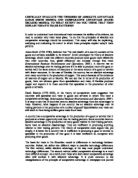The biggest problem when it comes to how affective comparative advantage is in dictating trade is that all factors of production are assumed to be perfectly mobile, something which it is fair to say is never the case. The idea is that any factors of production, be it labour, capital, land or entrepreneurship, that these, if made redundant from one industry it is thought that these resources could immediately be transferred to another industry that has a comparative advantage over the other country. This is clearly not going to be case, unless the industries are very similar, something which contradicts another theory of comparative advantage, which states all goods are homogenous. It is therefore almost an impossibility for this to occur, for the unemployment created by a failed industry to be suddenly removed by another. Structural unemployment of people without the necessary skills to work, is inevitable. Even in the EU, where the S.E.A single market was set up in 1986, it is still difficult just to go and work in another EU country for geographic, structural and lingual reasons. The government would have to spend a huge amount on supply side policies such as very efficient schemes of education or perhaps low taxation (Thatcherite) to be able to transfer skills that quickly, and shift the long run aggregate supply curve to the right, thus reducing unemployment:
Because the government realises just how unlikely and difficult it is to transfer resources, it actively discourages the failure of an industry, as shown by the EU’s enormous subsidies of the farmers in this country, most notably the Common Agricultural Policy. It is therefore acting against the theory of comparative advantage, as this would dictate that the farmers move into the service sector, where Britain is very productive. This shows how politics has a great affect on trade once the industry has been established, though comparative advantage may well have dictated what industries were originally started and how they grew, even if politics has a greater effect today.
The fact that politics makes a big difference in the effect of comparative advantage demonstrates another shortcoming of the theory. It assumes that trade around the world is completely free, something which is increasingly true, although the creation of the EU has meant that trade within the EU is almost completely free, while from in the EU to the rest of the world, protectionist policies are in place. There also continue to be some semi-autarkic countries such as North Korea.
If cricket bats are made in both England and Pakistan, if Pakistan has the comparative advantage in making the good, in terms of Panama hats for example, consumers in the UK may well still buy cricket bats from British producers, for several reasons, most importantly that policies such as tariffs or quotas may well be in place on goods entering the EU, in which case the goods are no longer price competitive. This is shown below:
However, the large sales of cricket bats in the UK may well also be for other reasons. Cricket bats are not a homogenous product, with different bats suiting different players, and other non-price competitive reasons such as a higher quality of bat made domestically or that there is better after-sale support. This is something that the theory of comparative advantage does not take into account. It may also be very expensive to transport the bats to the UK from Pakistan, making it no longer economically efficient to trade here. This is something else that is not taken into account by the model.
All these things aside, the reasons why countries trade is for the benefits that arise from the trading, such as specialisation increasing output, economies of scale, innovation through competition and the welfare gains in increasing the consumers choice. It is at no stage a random process as to what goods are traded, and there are good reasons for why bananas aren’t grown in England and sheep aren’t reared in the West Indies. The productivity of a country in producing a good dictates what it will trade, and a country that is very inefficient in producing a good will move onto something to which it is more suited. There are of course cases where this is overridden by the factors mentioned, but ultimately comparative advantage theory does form a ‘basis’ as the title suggests, to almost all international trade. For the trade to occur, the terms of trade are laid out, which is simplified to compromising between the opportunity cost ratios of the two countries. Once again, this is not exactly how it works, as politics and economics merge to create something slightly different, but it is highly likely to be something close to what comparative advantage suggests it should be. It is inevitable that the model does not fit the real world, but there is not a single economic theory that can be applied directly to an economy with no assumptions being made.







